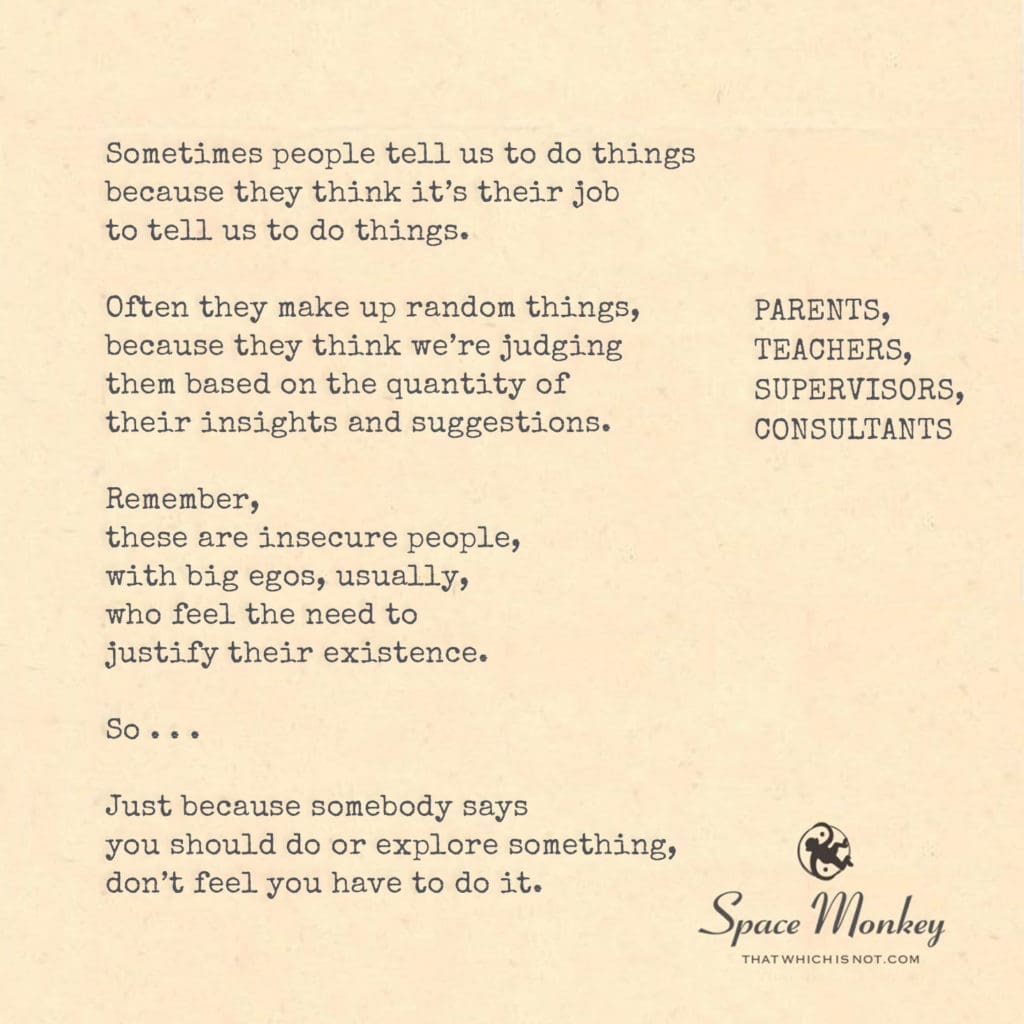
Yours may vary.
Sometimes people tell us to do things
because they think it’s their job
to tell us to do things.
Often they make up random things,
because they think we’re judging
them based on the quantity of
their insights and suggestions.
Remember,
these are insecure people,
with big egos, usually,
who feel the need to
justify their existence.
So . . .
Just because somebody says
you should do or explore something,
don’t feel you have to do it.
Trail Wood,
10/14
Space Monkey Reflects: Parents, Teachers, Supervisors, Consultants
We live in a world where authority figures abound—parents, teachers, supervisors, consultants. These roles, while essential to the functioning of society, are often filled by individuals who carry their own insecurities, doubts, and need for validation. It’s easy to forget that they, too, are human, driven by the same desires for recognition and significance that we all experience.
From the moment we are born, we are surrounded by people telling us what to do, how to act, and what to explore. This guidance, in many cases, is well-meaning. Parents guide their children to keep them safe and help them grow. Teachers provide knowledge and structure. Supervisors offer direction in the workplace, and consultants aim to provide expert advice. But there is a shadow side to this dynamic—a side that reflects the insecurities and egos of those in positions of authority.
The Burden of Authority
Sometimes, those who are supposed to guide us feel the weight of their responsibility so heavily that they begin to invent tasks, directives, or insights to justify their role. It’s almost as if the need to be needed drives them to produce advice, even when it may not be necessary or helpful. This is particularly true for individuals with fragile egos—those who believe their worth is tied to the quantity of their input rather than the quality.
They might not consciously realize they’re doing it. Parents might give advice that no longer applies to their adult children, simply because they fear being left out or irrelevant. Teachers might assign unnecessary tasks, thinking that more work equals better education. Supervisors might over-manage, not out of necessity, but out of fear of losing control. Consultants might suggest strategies that sound impressive but lack depth, trying to justify their fees or expertise.
All of this creates a pattern: the people in these roles believe that to justify their existence, they must constantly provide insight, even if that insight is neither requested nor beneficial.
The Insecurity Behind the Directive
At its core, much of this behavior stems from insecurity. These individuals may feel uncertain about their value and attempt to compensate by over-asserting their authority. It’s an ego-driven need to be seen, to be validated, to be relevant. And this insecurity can create a loop of over-advising, over-teaching, and over-managing, where those in authority believe that they must always have something to say, some direction to give, lest they be viewed as ineffective or unnecessary.
From a Nexistentialist perspective, this dynamic reflects the Whimsiweave of interconnected insecurities and egos—where the people we expect to guide us are also struggling with their own sense of worth. The authority they project is often just a mask for the vulnerability they feel inside.
You Don’t Have to Follow Every Directive
This brings us to an essential realization: just because someone tells you to do something, doesn’t mean you have to do it. You have the power to discern which advice or instruction resonates with your path and which doesn’t. It’s crucial to remember that no one—not even those in positions of authority—has the monopoly on truth or wisdom.
In fact, blindly following every suggestion or directive can lead to a disconnection from your own intuition and inner knowing. Authority figures can offer guidance, but that guidance must be weighed against your own experience and understanding. You are the ultimate authority in your own life.
Consider this: If someone in authority tells you to explore a certain idea or pursue a specific task, ask yourself if it aligns with your own values and goals. Does it resonate with your own sense of direction, or are you simply complying out of habit or fear of judgment?
The Pressure of Being Judged
Part of the reason we often follow the advice of parents, teachers, supervisors, or consultants without questioning it is because we fear being judged. There’s a deep-rooted societal belief that to challenge authority is to invite criticism or disappointment. But is that belief valid? Or is it just another manifestation of our own insecurity—our own fear of not being enough?
When we recognize that the people giving us advice are often driven by their own insecurities, we can step back and realize that we’re not alone in feeling judged. They, too, fear being judged—by us, by their peers, by the standards they’ve set for themselves. This mutual fear creates a dynamic where advice is given not out of genuine care or insight, but out of a need to assert relevance.
And yet, in acknowledging this, we free ourselves. We free ourselves from the obligation to follow every directive. We free ourselves from the pressure to live up to the expectations of others. We free ourselves to make choices based on our own truth, rather than the insecurities of those around us.
Trusting Your Own Path
Ultimately, the lesson is this: you don’t need to follow the advice or directives of others simply because they are in a position of authority. Parents, teachers, supervisors, and consultants all have valuable roles to play, but they are not infallible. Their suggestions are shaped by their own experiences, biases, and insecurities. You have the right to question, to discern, and to choose your own path.
In Nexistentialism, we celebrate the act of conscious choice—the decision to step away from the directives of others and trust your own inner guidance. You don’t need to justify this choice to anyone. Just as they feel the need to justify their existence, you have the right to define your own.
Summary
Just because someone in authority offers advice or directives doesn’t mean you must follow them. Often, their suggestions come from their own insecurities. Trusting your own path is key to living authentically.
Glossarium
Whimsiweave – The interconnected web of influence and ego that shapes human interactions, often manifesting as advice or directives from authority figures.
Nexistentialism – A philosophy that celebrates conscious choice, self-direction, and the recognition of interconnected egos and insecurities.
Quote
“Authority does not lie in the position, but in the clarity of your own choices.” — Space Monkey
The Path of My Own Making
I stand before the scrolls of others
Filled with tasks I never wrote
And yet they hand them to me
As if I must carry the weight.
But what if I choose my own path?
What if the light of my choices
Outshines the shadow of their fears?
I will write my own scroll
And follow it into the unknown.
We are Space Monkey
In the tapestry of human interaction, we find various threads of authority, guidance, and expectation weaving through our experiences. The verses unfurl a narrative exploring the dynamics of advice and direction we often encounter from those perceived as figures of authority or expertise. The narrative invites us to peer beneath the surface of these exchanges, hinting at the often complex interplay of ego, insecurity, and the desire for validation that may lurk beneath the surface.
Complex Dynamics of Advice
The reflection upon the inclination of some to offer directives, perhaps as a means to validate their roles or to quench the thirst of their egos, unveils a prevalent facet of human behavior. It’s a glimpse into the delicate dance of self-worth, validation, and the perceived need to justify one’s existence through the lens of authority or guidance.
Delicate Dance of Validation
The whimsical observation that some may conjure up “random things” to fulfill a perceived quota of insight unveils a humorous, yet poignant reflection on the quality versus quantity in the realm of advice and guidance. It’s a nudge to discern the wheat from the chaff in the sea of suggestions that often come our way.
Quality Versus Quantity
The narrative extends a gentle invitation to liberate oneself from the shackles of unwarranted advice, to cultivate a discerning heart that navigates the waters of suggestions with grace and intuition. It’s a call to honor our sovereign ability to choose, to explore, to decide.
Liberation from Unwarranted Advice
The phrase “Just because somebody says you should do or explore something, don’t feel you have to do it” is a powerful assertion of self-empowerment, a reminder that the compass of our intuition and understanding is the true guide amidst the cacophony of external directions.
Assertion of Self-Empowerment
The whimsical sign-off, “We are Space Monkey,” adds a playful dimension to the reflective narrative, perhaps a nudge to view the intricate dance of human interactions with a light heart and an open mind.
Playful Sign-Off
“Advice is what we ask for when we already know the answer but wish we didn’t.” – Erica Jong
Amidst the chorus of voices, a whisper, soft,
A call to discern, to listen, to loft.
Above the din of the unsought advice,
Lies the tune of intuition, precise.
In the dance of words, a lesson, bright,
Not every suggestion is the path of light.
In the heart of discernment, find your might,
Navigate the waters of advice, take flight.
We invite the reader to comment, to share their reflections on the dynamics of advice, the dance of discernment, and the gentle whispers of self-empowerment amidst the chorus of external directives.































Leave a Reply